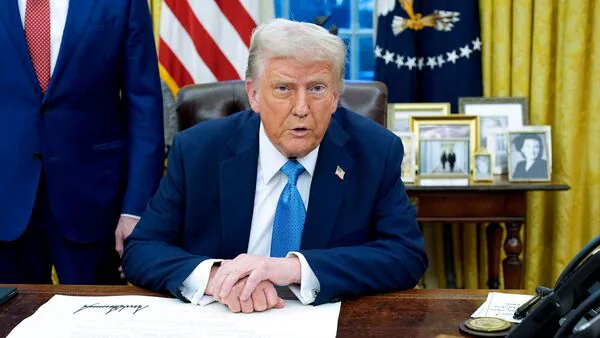The United States will impose a 25-percent tariff on steel and aluminum imports this week, President Donald Trump announced on Sunday, marking the latest in a series of trade measures he has introduced.
Speaking to reporters aboard Air Force One, Trump stated that the tariffs, which he will officially announce on Monday, will apply to “any steel coming into the United States,” and will also affect aluminum imports.
Trump had previously imposed similar tariffs during his first presidency (2017-2021) to protect U.S. industries, arguing they faced unfair competition from countries in Asia and Europe.
According to U.S. trade data, Canada is the largest source of steel and aluminum imports to the U.S., with Brazil, Mexico, and South Korea also being significant suppliers.
In addition to the steel and aluminum tariffs, Trump revealed on Sunday that he would introduce “reciprocal tariffs,” aimed at matching other countries’ rates for U.S. products. “Every country will be reciprocal,” he said, adding that a detailed announcement on these tariffs will be made on Tuesday or Wednesday.
Trump has long used U.S. financial power as a tool in trade negotiations, ordering tariffs on China, Mexico, and Canada shortly after taking office. He temporarily paused the 25-percent tariffs on Canada and Mexico after both countries agreed to strengthen measures against drug fentanyl flows and curb undocumented migration to the U.S.
However, tariffs on China proceeded, with a 10-percent levy imposed on products entering the U.S. starting last Tuesday. In response, Beijing introduced targeted tariffs on certain U.S. products, including coal and liquefied natural gas, which will take effect on Monday.
The new Chinese tariffs will apply to $14 billion worth of U.S. goods, while Trump’s tariffs impact $525 billion in Chinese goods, according to Goldman Sachs.
– “Golden Age” –
Trump has also announced plans to impose tariffs on the European Union, pledging to introduce “reciprocal tariffs” in the near future.
In a CNN interview aired Sunday, French President Emmanuel Macron said he would confront Trump over his financial threats to Europe, though he suggested that the U.S. should focus its efforts on China instead of the EU. Macron also warned that any tariffs imposed on Europe would drive up costs and contribute to inflation in the U.S.
Meanwhile, in a mostly friendly meeting with Japanese Prime Minister Shigeru Ishiba on Friday, Trump warned that Japan could face tariffs on its exports if it doesn’t reduce the U.S. trade deficit with Japan to zero.
The U.S. trade deficit, the largest in the world, grew to nearly $920 billion last year.
Trump, who has promised a “new golden age” for the U.S., has insisted that the tariffs will impact foreign exporters rather than U.S. consumers, despite most experts predicting otherwise. He acknowledged, however, that the tariffs on Mexico, Canada, and China could cause economic “pain” for Americans.
Trump has often used tariffs as leverage to achieve broader policy objectives. Recently, he threatened to impose them on Colombia after it refused to accept U.S. military planes carrying deported migrants. Following a tense standoff with Trump, the Colombian government relented.



